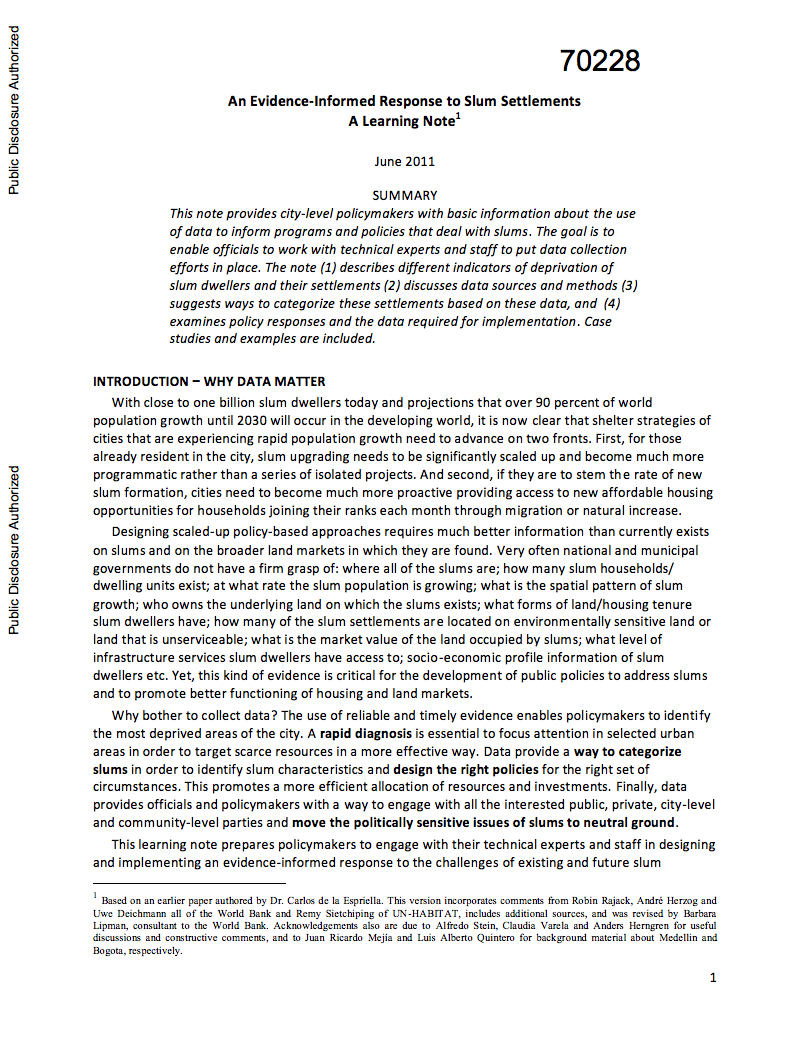The World Bank is a vital source of financial and technical assistance to developing countries around the world. We are not a bank in the ordinary sense but a unique partnership to reduce poverty and support development. The World Bank Group has two ambitious goals: End extreme poverty within a generation and boost shared prosperity.
- To end extreme poverty, the Bank's goal is to decrease the percentage of people living on less than $1.25 a day to no more than 3% by 2030.
- To promote shared prosperity, the goal is to promote income growth of the bottom 40% of the population in each country.
The World Bank Group comprises five institutions managed by their member countries.
The World Bank Group and Land: Working to protect the rights of existing land users and to help secure benefits for smallholder farmers
The World Bank (IBRD and IDA) interacts primarily with governments to increase agricultural productivity, strengthen land tenure policies and improve land governance. More than 90% of the World Bank’s agriculture portfolio focuses on the productivity and access to markets by small holder farmers. Ten percent of our projects focus on the governance of land tenure.
Similarly, investments by the International Finance Corporation (IFC), the World Bank Group’s private sector arm, including those in larger scale enterprises, overwhelmingly support smallholder farmers through improved access to finance, inputs and markets, and as direct suppliers. IFC invests in environmentally and socially sustainable private enterprises in all parts of the value chain (inputs such as irrigation and fertilizers, primary production, processing, transport and storage, traders, and risk management facilities including weather/crop insurance, warehouse financing, etc
For more information, visit the World Bank Group and land and food security (https://www.worldbank.org/en/topic/agriculture/brief/land-and-food-security1
Resources
Displaying 2706 - 2710 of 4907An Evidence-Informed Response to Slum Settlements : A Learning Note
This learning note prepares policymakers
to engage with their technical experts and staff in
designing and implementing an evidence-informed response to
the challenges of existing and future slum settlements. To
that end, the note discusses a set of indicators and data
analysis techniques needed in the identification and
characterization of slums as well as relevant lessons and
examples. In addition, the noted discusses the data
South Kordofan : A Growth Diagnostic
This report attempts to diagnose
existing constraints and prospects for growth in
people's incomes in South Kordofan. Given the breadth
and depth of difficulties facing the state, the focus is on
identifying the key areas of reform, or binding constraints,
to growth. There is a combination of extremely low social
returns, the prevalence of government and market failures,
the weak investment climate and the limited access to
Improving Water Management in Rainfed Agriculture : Issues and Options in Water-Constrained Production Systems
Due to climate change and increasing
food prices, emphasis needs to be placed on addressing water
management as a key determinant for agricultural production
and productivity. However, governments and donors have
tended to pay relatively little attention to this area, and
investments remain low. This report, which is based on
economic and sector work carried out in the Water Anchor of
the World Bank, highlights the importance of improving water
Arab Republic of Egypt : Detailed Assessment Report on Anti-Money Laundering and Combatting the Financing of Terrorism
This assessment of the anti-money
laundering (AML) and combating the financing of terrorism
(CFT) regime of the Arab Republic of Egypt (Egypt) is based
on the Forty Recommendations 2003 and the Nine Special
Recommendations on Terrorist Financing 2001 of the Financial
Action Task Force (FATF), andwas prepared using
the AML/CFT assessment Methodology 2004, as updated in
February 2008. The assessment team considered all the
Expanding Access to Housing Finance : Task 1. Business and Sustainability Plan for Affordable Housing Finance Pilot Projects
The objective of the First Initiative
Project in Uganda is to expand the access of households to
housing finance, especially modest and lower income
households, by introducing new and innovative housing loan
products, by introducing innovative loan products combined
with affordable housing designs. The project has delivered
two studies to the Bank of Uganda: i) a study addressing the
financial and banking sector context for housing finance,







